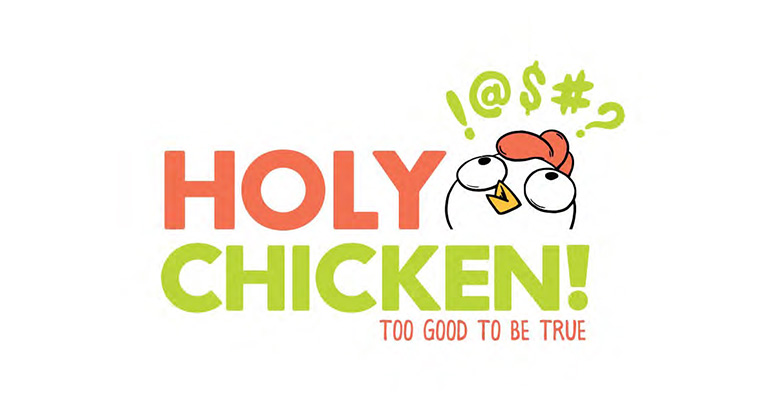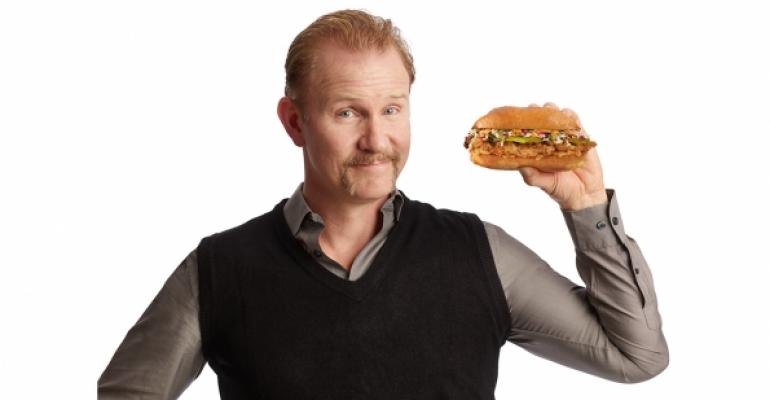Morgan Spurlock’s test of a chicken-sandwich concept was likely more of an exposé of misleading restaurant industry practices than a serious restaurant, according to local news accounts.
The “Super Size Me” filmmaker opened a four-day pop-up restaurant in Columbus, Ohio, on Saturday called Holy Chicken! The goal was ostensibly to get customer feedback for a permanent restaurant to open in January. Crispy chicken sandwiches on the menu were made with meat raised specifically for the restaurant and described as “cage free,” “hormone free,” “antibiotic free” and “free range.”
According to The Columbus Dispatch, the restaurant, located in a former Wendy’s unit, opened with fanfare from local officials to customers lined up around the building.
Inside, however, the restaurant was designed to call out a quick-service industry that allegedly uses marketing and spin to convince customers that they are eating more healthfully, when they really are “eating the same tired food that they always have,” Spurlock told the Dispatch.
In an interview with Nation’s Restaurant News Monday, Spurlock insisted it was not a stunt. Customer feedback would be shared with investors interested in backing a permanent restaurant, he said.
The goal, however, was to show consumers how buzzwords now commonly used to convey a better-for-you-positioning are limited in meaning, he said. Phrases like cage-free and range-free imply happy chickens raised on open pastures, which is inaccurate, he said.
“This nomenclature used in the food industry today is something people don’t really know about, and I think people were a little taken aback by that,” Spurlock said. “We trust in companies to tell us honestly what our food stands for, and things aren’t really what they seem.”

Cards on tables at Holy Chicken said the meat used was “pretty much the same as all industrial chickens,” according to the Dispatch.
Workers wore tee shirts saying “part time, all the time,” and signs in the kitchen indicated a “flavor char application station.”
On the green walls, large letters informed customers: “The color green makes you feel healthy and relaxed.”
Spurlock told the Dispatch that the color orange was also used because “it makes us seem cheerful and youthful and way hipper than those other restaurants.”
A sign at the cash register suggested that the wood it was on would give customers “thoughts of nature, trees, cute little farms with barns and other healthy stuff.”
On the wall, the brand’s “farm-to-table story” included information about chickens as “the most farmed animal on the planet, mainly because they’re cheap, delicious and can go from birth to bun in just seven weeks!”
Americans eat more than 8 billion chickens a year, or more than 250 birds per second, the wall said.
Still, on Instagram, where the restaurant was posting with the hashtag #toogoodtobetrue, it appeared Holy Chicken! sold out of its $7.50 sandwiches within hours.
Spurlock was joined at the event by chicken farmer Jonathan Buttram, whose W.J. Buttram Farms in Alabama raised the chicken served at the restaurant. The chicken was branded as Morganic Fresh Farm, although it is not organic.
Buttram, a third-generation chicken farmer in operation for 38 years, said producers like him are forced to raise chickens in deplorable conditions by suppliers for restaurants and grocery stores who use labels like cage-free, range-free, antibiotic-free and hormone-free to convey a better product.
Saying he grows chickens for Koch Foods, for example, Buttram said those chickens are no different than other mass-produced birds, raised in crowded barns without windows or access to natural light. Their feet and lungs are often burned by ammonia, and many birds are severely injured, with broken legs, but still processed.
“Those birds are raised in horrendous conditions, and the company forces me to do that,” Buttram said. “I can’t choose the way I want to grow them.”
Koch Foods did not immediately respond to requests for comment.
The lack of country-of-origin labeling has also allowed foreign meat to flood the market, putting more pressure on American growers to compete, and making it more difficult for them to grow a clean and healthful product, Buttram said.
“I want this industry cleaned up,” Buttram said. “I want safe food that people can eat. If I wouldn’t eat it, you shouldn’t have to.”
The chickens raised for Spurlock, meanwhile, were actually grown under better conditions, Buttram said.
“They had a lot of space, and they had clean beds, and they weren’t sitting in their own feces,” he said.
The barns had windows, and the chickens had access to natural light. They were raised without antibiotics. They grew to six pounds in less than six weeks, and “they didn’t die,” like conventionally raised chickens often do.
Buttram said his company has already been blackballed by contractors for his outspoken stance on chicken farming practices, and he expected to lose some contracts as a result of his work with Spurlock.
But he did it to show that it could be done, he said.
If consumers were willing to pay just 25 cents more for a sandwich like the one served at Holy Chicken!, farmers could raise chickens in a cleaner and more healthful way, Buttram said.
“There are hundreds of growers that could grow chicken like these we have in this restaurant here,” he said. “I would rather eat this bird than any other in the U.S.”
Contact Lisa Jennings at [email protected]
Follow her on Twitter: @livetodineout





